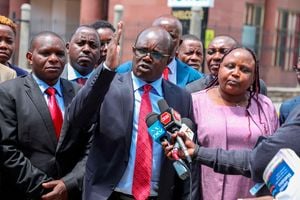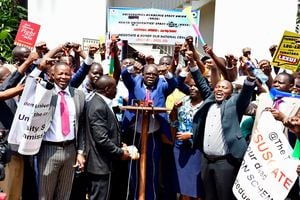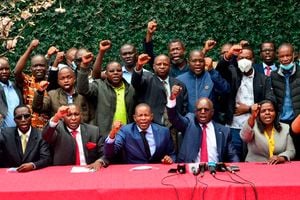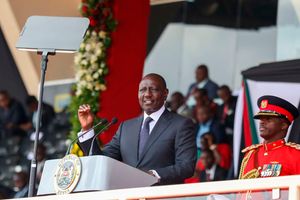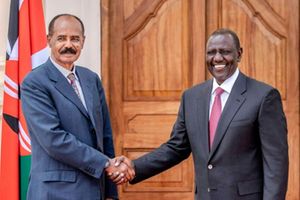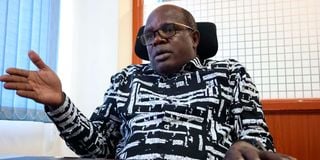
The secretary-general of the Universities Academic Staff Union Constantine Wasonga.
The secretary-general of the Universities Academic Staff Union (Uasu) Constantine Wasonga caused a light-hearted moment a month ago at a press briefing when he declared the resumption of a nationwide lecturers’ strike that would later ground learning in the public institutions for a month.
“As the secretary-general of Uasu, I, Dr Constantine Wasonga Opiyo, PhD, LLB (Hons), LLM, CBA, return-to-work formula, I’ve declared the strike officially launched,” he said, enumerating his academic and, comically, the union’s achievements.
In a press conference later, Dr Wasonga, when challenged by journalists to address the plight of students as the strike raged on retorted that he, too, was suffering as he is a student and brandished his student identity card.
Indeed, Dr Wasonga is a student at the University of Nairobi, where he is pursuing his second doctorate degree. Acquiring a PhD is a tall order for many, and only a few attempt a second one and in totally different field.
In an interview with Higher Education, Dr Wasonga revealed that he has acquired all his degrees from the University of Nairobi. His first degree is a Bachelor of Education (Arts) where his teaching subjects were history and religious education.
After graduating, he taught in a number of secondary schools, including Maseno School, and then enrolled for a master of education degree in 2008, specialising in education administration and planning. He transitioned to teaching at Maseno University then studied for and attained a PhD in education.
After Dr Wasonga was elected Uasu secretary-general in 2016, he was not prepared for what lay ahead of him. The union, under his leadership, called a lecturers’ strike in 2017.
“We knew we were right. It was a case where we signed a collective bargaining agreement (CBA). It was registered but not implemented. I called a strike but the government was very hard on lecturers. They were sacked right, left and centre for participating in the strike. When we went to court, the Employment and Labour Relations Court ordered us back to class. How did the judge decide that we were wrong and say that our strike was unprotected? That evening, I went to the University of Nairobi and made an application to study law,” said Dr Wasonga.
Bachelor of Law
It occurred to him that he needed more than the support of the members of the union to succeed and he immediately enrolled for a Bachelor of Law (LLB) degree at the UoN.
“After graduation, I went to Kenya School of Law [for his diploma after the Advocate Training Programme]. I’m a qualified advocate of the High Court. My law firm [C.O Wasonga & Company Advocates) is on the second floor of this building,” he said during an interview at UniAfric House on Koinange Street.
The Uasu headquarters is based on the third floor of the same building. He revealed that since the qualification, his law firm has represented other trade unions in labour disputes.
Our interview was interrupted a couple of times by his staff who wanted him to have a look at some legal documents. He seemed particularly interested in one but still allowed the interview to go on.
“That’s the draft of the return-to-work formula for Moi University. We have to agree to re-open the university for learning to re-start,” he said.
The deal was signed on Saturday and the staff at the university agreed to return to work today .
Dr Wasonga was not satisfied with the degree in law and later undertook to study for a masters’ degree in law (LLM), specialising in governance and democracy. He told Higher Education that the new knowledge he acquired as come in handy in his negotiations for better terms of work for university lecturers.
“I believe in doing the right thing. As a union leader, you need to know your rights in order to advise and defend your members’ rights. As secretary-general, you must be ahead of the people you’re negotiating with,” Dr Wasonga said.
We sought to find out how he juggles between his work at the university, studying and union affairs.
“I took a leave-of-absence from the university [for 10 years] because my position is a full-time job. I’m serving my second and last five-year term. I leave the office at 4pm and go for my evening classes. I sleep quite early. You can find me asleep by 8.30pm but I wake up every day at 2am. You’ll find me quite early in the library,” Dr Wasonga said.
The trade unionist is happy with the deal he struck last month for Uasu members. He stuck to his guns until the government finally committed to pay Sh9.7 billion towards lecturers’ increment of their basic salaries. The government had insisted that it would pay the lecturers Sh4.3 billion only and was reluctant to commit that in writing.
Sh4.3 billion
The payout will be made in three tranches of Sh4.3 billion, in the current financial year, and then Sh2.7 billion in the subsequent two financial years.
“It’s up to the government to honour the return-to-work deal. If it doesn’t, we’ll be ready to demand what’s ours,” he said.
Other benefits that the dons stand to receive include better provisions for car loans and mortgage as well as promotions.
“At first we were negotiating with the Inter-Public Universities Councils Consultative Forum (IPCCF) and then we realised IPCCF is an organisation that doesn’t have money of its own; they don’t have a budget. This budget had to come from somewhere and that’s the Ministry of Education. That’s why we pushed for formation of an inter-ministerial committee which was initiated by Labour Cabinet Secretary Dr Alfred Mutua,” Dr Wasonga explained.
When the committee did not yield the desired results, Uasu petitioned the National Assembly. Committee on Education.
“We realised that the MPs also wanted to impose the Sh4.3 billion on us. That’s when we went to the Cabinet Secretary for Education Julius Ogamba. I credit him for unlocking the stalemate,” Dr Wasonga said.
During the interview, the Uasu boss attributed the problem that bedevils public universities to mismanagement.
“There’s a lot of extravagance in our universities unlike other sub-sectors of education where there are checks and balances. Nobody supervises them to an extent that when I was elected secretary-general of Uasu, universities didn’t know the number of staff they employed. Even the Ministry of Education didn’t know the number. We commissioned a study and established that the number of staff was around 30,000,” he revealed.
He accused the managements of universities of hiding crucial data from the government to conceal the amount of money they were making during the period when Module II programmes were money-minting programmes.
“Since they didn’t want the government to know [their revenue], the government started reducing the capitation and they weren’t complaining because they had a second stream on income. When that stream dried up, that’s why we are here now,” Dr Wasonga said.
He blamed the managements of universities for what he termed “over-expansion”. This, he said, became a burden when the self-sponsored programmes collapsed. The staff in the satellite campuses were rerouted to the main campuses although they were not needed there. Maintenance of the buildings also became a problem for universities.
Dr Wasonga said that by the time his term as Uasu secretary-general expires, he hopes to have graduated with his PhD in law. He will then go back to the lecture hall in early 2027, for that is his ‘habitat’.

